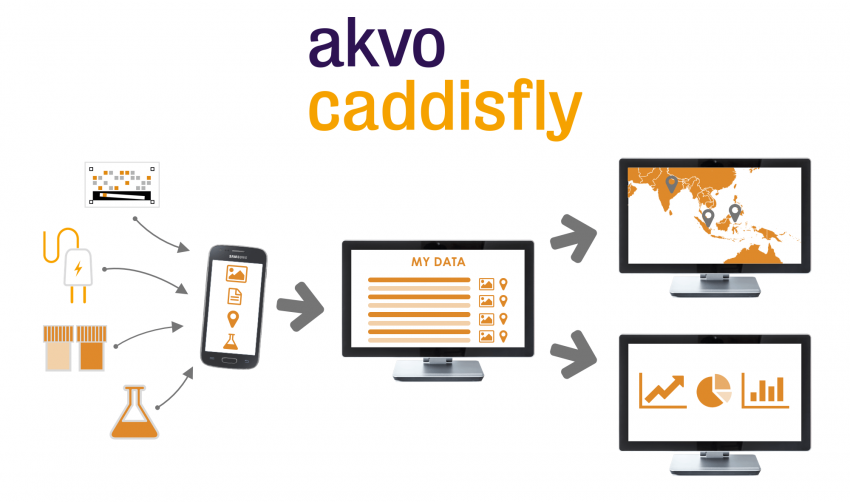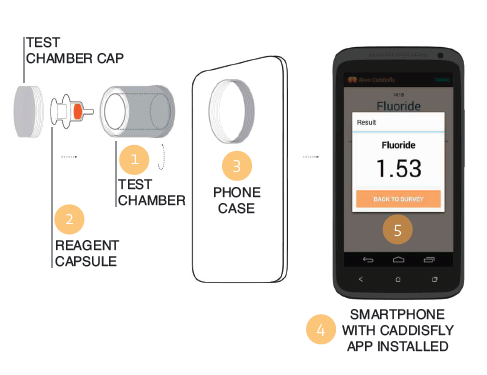Akvo Caddisfly
Fast and easy drinking water testing using a smartphone.
Akvo Caddisfly is a simple, fast, portable and low cost drinking water testing kit that can be used anywhere to quickly analyse the level of fluoride in drinking water, using a smartphone. Currently under development, it also allows water quality data to be accurately mapped and shared online.
Both its hardware and software are open source. Akvo Caddisfly will set a new standard in effective gathering and sharing at scale of data relating to drinking water quality, using the best available tool for this purpose – the smartphone.
For water quality monitoring to be scaled up to national level, we need to be able to test water quality on the ground in a fast, affordable, and scalable way. Akvo’s low cost, open source, smartphone-based water quality testing system measures 29 water quality parameters for SDG 6 combining four different technologies: colorimetry, sensors, microbiology, and test strips.
Connected to third party hardware and an online data platform, this system allows you to combine water quality data with GPS data, metadata and qualitative data. This means that you can easily interpret test results, create interactive maps, and generate insights for decision making at regional or national level. Testing can be scaled up affordably with data immediately accessible and shareable via an online dashboard. Test results from various locations will be shared online enabling communities to evolve locally relevant and sustainable systems for better drinking water. The Caddisfly Water Quality Test Kit aims to help detect major water quality parameters like Fluoride, Nitrate, Arsenic, Coliforms, Electrical Conductivity, etc.
Contents
Why is Akvo Caddisfly needed?
Globally, over 780 million people do not have access to clean water. In India and elsewhere, fluorosis is a serious health issue and more than 100 million Indians are at risk because they drink water containing fluoride or other contaminants such as arsenic or coliform bacteria. Existing water quality-testing procedures fall short in a number of ways. Field-test equipment is often hard to use and unreliable and lab tests are costly and slow. Resulting data is generally stored locally and not shared effectively. This makes it hard to quickly collect, analyse, present and efficiently use data to resolve drinking water issues.
Testing drinking water has never been so easy
- Fill the reusable test chamber with a sample of water, place the reagent capsule inside and close it.
- Attach it to the phone case on your smartphone and run the Caddisfly app.
- Place the smartphone facedown, and wait around a minute until you hear a loud click.
- The fluoride test result is now displayed on the smartphone’s screen.
- Data results can be shared online via Akvo FLOW, Akvo’s mobile phone-based field survey tool.
Technical facts
- The test chamber contains the water sample and can be re-used for thousands of tests.
- The reagent is dispensed automatically from the capsule.
- The smartphone’s camera acts as a colorimeter sensor, using the flash to illuminate the sample.
- The Akvo Caddisfly app analyses the water sample photograph against a calibrated range, giving an accurate and reliable result after one minute.
- The smartphone’s GPS accurately identifies the location and the results can be integrated and reported via Akvo FLOW.
Testing methods
- Colorimetry: Lovibond MD610, Photometer, CHECKIT comparator, Pooltester
- Test strips: Quantofix, Hach, Merck
- Sensors: Lovibond SD70, Lovibond SD50
- Microbiology: Aquagenx Compartment, Bag Test
Benefits of Akvo Caddisfly
|
History and current status of the concept
In August 2012 Ternup Research Labs was set up in Bangalore, India, to develop products aimed at solving drinking water problems in India and elsewhere. In 2013, TernUp partnered with Akvo to develop Caddisfly and became Akvo’s R&D hub, in India.
In 2014, a first Caddisfly prototype to test fluoride levels was developed. It is now being field-tested and the first positive outcomes are being recorded. A sensor measuring water temperature and conductivity (EC) has also been developed to test the salinity of drinking and irrigation water. This simply connects to the micro-USB port of the phone and test results are read by the Caddisfly app. Work is currently focussing on standardising the low cost hardware components and improving the usability of the software (the Caddisfly app). This is the groundwork to ensure a reliable, low cost drinking water test that can later be reproduced at scale.
By mapping the quality of water sources and presenting the results in an effective way, Ternup and Akvo aim to support access to safe drinking water.
Contacts
Partnerships Akvo Foundation
Hans Merton (Amsterdam, Netherlands)
hans(at)akvo.org +31 6 19 82 10 96 www.akvo.org


